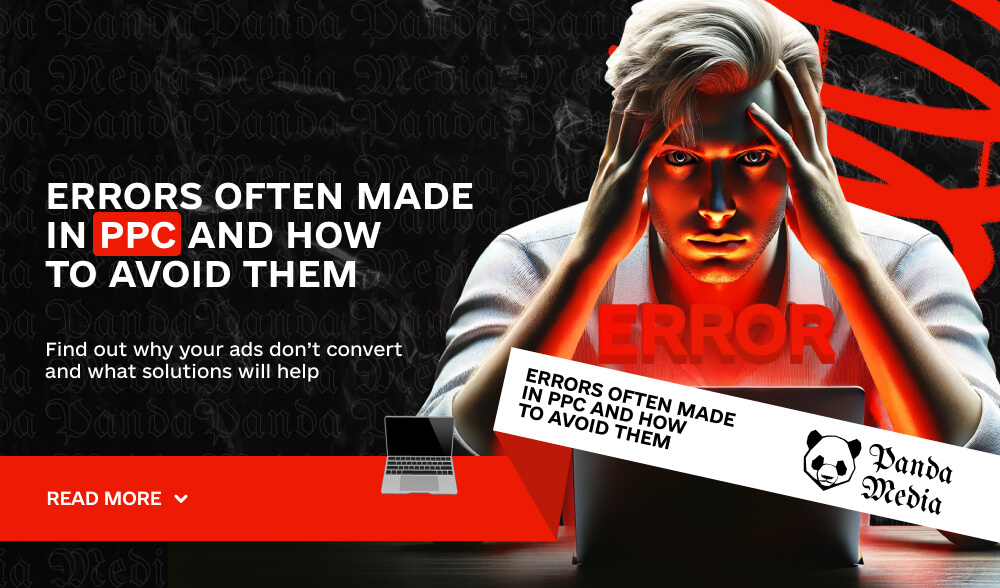Don't miss interesting news

PPC is an interesting beast: everything may be going well, and then any unsuccessful combination of PPC campaign parameters and the conversion page leads to inefficient spending of your budget. Let’s look at typical mistakes made by PPC specialists and ready solutions to avoid them.
This is especially noticeable in large accounts, where it’s difficult to identify ineffective keys.
Such a mistake often leads to undesirable consequences:
To prevent similar situations, it’s important to set strict rules for yourself and clearly understand the purpose of using each keyword, its connection with the conversion page in terms of matching offers, calls to action, and customer expectations. Perhaps your site has the same flaws mentioned earlier?
Solution: Use only effective keywords.
Do not let ineffective words drain your budget. Compile a simple set of keywords for a specific advertising campaign and establish clear rules for yourself, especially for ads such as CTR and CPA. These rules will be unique to your profile and keyword, aimed at maximizing profits and attracting customers.
Let’s consider a few rules for evaluating keywords:
Is the traffic on your conversion page unexpectedly interrupted during the day? Did your advertising campaign’s budget run out in the morning?
Controlling expenses can be helped by the PPC advertising model.
Solution: Use a traffic distribution schedule.
To optimize daily traffic costs, implement a scheduling system. This will allow your ads to appear at times of maximum user activity.
In cost settings, you can reduce or completely stop payments during the least profitable hours, ensuring more prolonged and effective use of the budget.
For an individual pricing strategy on certain days, consider collaborating with consulting agencies, which report up to a 69% increase in efficiency when implementing a schedule.
Additional methods to increase budget effectiveness:
It’s unlikely that users will be satisfied with a discrepancy between the ad and the target page. If you have an impressive CTR rate (about 5%) but a low conversion rate (less than 5%), there are likely clear inconsistencies.
Solution: Show potential customers a complete match between the information claimed and provided by you.
This is quite simple. The content of the advertisement must exactly match what is presented on the target page.
If your ad and target page are identical, but the conversion rate remains low, it should be acknowledged that your resource has repelled visitors, and it’s time to study methods of optimizing the target page.
It’s very interesting to profile prospective customers. However, that’s just the beginning.
The list of keywords for PPC advertising should not be limited to just one theme; it should include terms that describe the entire purchasing cycle (from research to readiness to purchase). It’s important, when creating this list, to consider the desires and needs of consumers.
By not paying proper attention to the needs and desires of buyers, which is key to high conversions, you will encounter low CTR effectiveness due to discrepancies between what is presented in search results and what you offer.
Ultimately, your perfectly prepared target page will go unnoticed.
Solution: Define your audience and formulate keywords that attract attention.
Check if the visual images presented by your client match the selected search terms. For example, the query “buy groceries” reflects the information search stage, while the phrase “where to buy groceries” indicates the purchasing stage.
Analyze whether Google tracks the keywords that interest you. Does the content of your site, including advertisements and posts, match the goals of your PPC advertising campaign?
Seek advice. If you have contacts in the target group, show them the ad or landing page. This will help ensure that your message resonates with the audience.
PPC requires an individualized approach, as there is no universal answer to questions of effectiveness. Studying these common mistakes will give you the opportunity to figure out why your advertising is bringing ineffective traffic to your target page. Maybe it’s worth considering options to improve conversion?